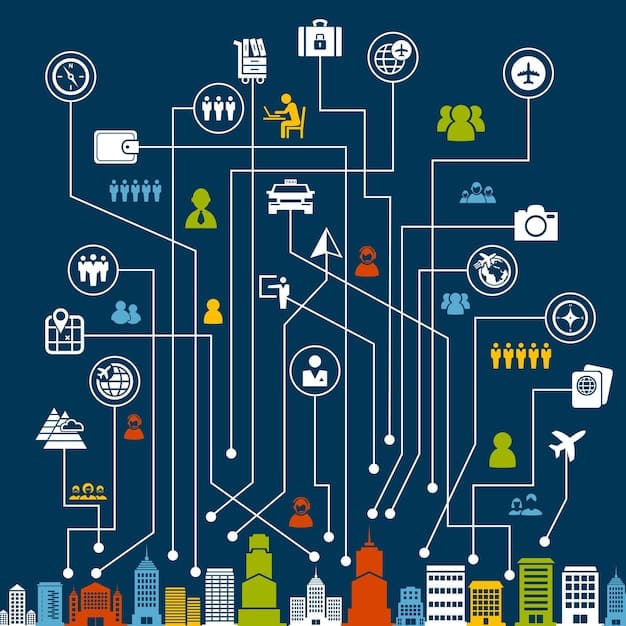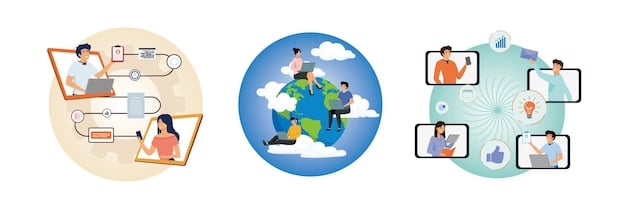Timeless Reports: Predicting the Future of Work & Your Career

Timeless Reports such as those focusing on the future of work provide insights into evolving job markets, technological advancements, and changing skill requirements, enabling professionals to proactively adapt their career strategies for long-term success.
Navigating the complexities of the modern workplace requires foresight. Timeless Reports offer invaluable insights into the future of work, empowering you to make informed decisions about your career path and stay ahead of the curve in an ever-evolving landscape.
Understanding Timeless Reports and the Future of Work
The concept of “Timeless Reports” in the context of the future of work refers to comprehensive studies and analyses that provide enduring insights into long-term trends and potential shifts in the job market. These reports aren’t just fleeting predictions; they are grounded in thorough research and data, offering a strategic perspective that can guide career planning and organizational development for years to come.
Understanding these reports is crucial because the world of work is constantly changing. Automation, globalization, and technological advancements are reshaping industries and creating new roles while rendering others obsolete. By studying Timeless Reports, individuals and organizations can anticipate these changes and proactively adapt to thrive in the future.

Let’s delve deeper into what makes these reports so valuable.
Key Characteristics of Timeless Reports
Timeless Reports are characterized by several key traits that set them apart from ordinary industry forecasts and news.
- Long-Term Perspective: They offer predictions and analyses that extend beyond the immediate future, often looking 5, 10, or even 20 years ahead.
- Data-Driven Insights: These reports rely on extensive data collection and analysis, providing an empirical basis for their conclusions.
- Comprehensive Scope: They consider a wide range of factors, including technological advancements, economic trends, demographic shifts, and social changes.
- Actionable Recommendations: Timeless Reports provide practical advice and recommendations for individuals and organizations seeking to prepare for the future of work.
Benefits of Studying Timeless Reports
Staying informed with reliable reports offers a multitude of benefits.
- Anticipate Future Trends: Identify emerging technologies, changing skill requirements, and new job roles.
- Make Informed Career Decisions: Choose educational paths, develop relevant skills, and pursue career opportunities that will be in demand in the future.
- Enhance Organizational Agility: Adapt business strategies, invest in employee training, and create a culture of innovation to thrive in a rapidly changing environment.
- Gain a Competitive Advantage: Stay ahead of the competition by proactively preparing for the future of work.
In summary, understanding Timeless Reports is essential for anyone who wants to navigate the future of work successfully. By providing a long-term perspective, data-driven insights, comprehensive scope, and actionable recommendations, these reports empower individuals and organizations to anticipate change, make informed decisions, and thrive in an ever-evolving landscape.
Major Trends Shaping the Future of Work
Several major trends are poised to significantly shape the future of work. These trends, often highlighted in Timeless Reports, are interconnected and influence each other, creating a dynamic and complex landscape.
One of the most prominent trends is the rise of automation and artificial intelligence (AI). These technologies are revolutionizing industries across the board, automating routine tasks and augmenting human capabilities. While automation may lead to job displacement in some areas, it also creates new opportunities for workers to focus on higher-level tasks that require creativity, critical thinking, and emotional intelligence.

Let’s explore top trends and how they will shape work.
The Gig Economy and the Rise of Flexible Work
The gig economy, characterized by short-term contracts and freelance work, is experiencing rapid growth. This trend is driven by several factors, including the increasing availability of online platforms that connect workers with employers, the desire for greater flexibility and autonomy among workers, and the need for businesses to access specialized skills on demand. Flexible work arrangements, such as remote work and telecommuting, are also becoming increasingly common, offering benefits to both employees and employers.
The Importance of Soft Skills
As technology continues to automate routine tasks, soft skills, such as communication, collaboration, creativity, and critical thinking, are becoming increasingly important. These skills are essential for workers to succeed in roles that require problem-solving, innovation, and interpersonal interaction. Timeless Reports consistently emphasize the need for individuals to develop and hone these skills to remain competitive in the future job market.
- Adaptability: The ability to learn new skills and adapt to changing circumstances.
- Communication: Clear and effective written and verbal communication skills.
- Problem-solving: The capacity to identify and solve complex problems using critical thinking and creativity.
The Expanding Importance of Remote Work
The COVID-19 pandemic has accelerated the acceptance and adoption of remote work. Many companies have discovered that remote work can be just as productive, and in some cases, even more productive than traditional office work. This trend is likely to continue as companies seek to reduce overhead costs, attract and retain top talent, and improve employee work-life balance.
These trends highlight the dynamic nature of the future of work. By understanding these changes, individuals and organizations can proactively prepare for the challenges and opportunities that lie ahead, ensuring long-term success in a rapidly evolving landscape.
Developing the Skills Needed for the Future
To thrive in the future of work, individuals need to develop a new set of skills that are aligned with the evolving demands of the job market. Timeless Reports consistently emphasize the importance of continuous learning and skill development.
One of the most critical skills is digital literacy. As technology becomes increasingly integrated into all aspects of work, individuals need to be proficient in using various digital tools and platforms. This includes everything from basic computer skills to more advanced skills, such as data analysis, coding, and cloud computing. Even if your primary job function isn’t directly related to technology, a solid understanding of digital tools can significantly enhance your productivity and effectiveness.
Focus on Continuous Learning
The skills required for success in the future of work are constantly evolving, making continuous learning essential. This means embracing a growth mindset and being open to acquiring new knowledge and skills throughout your career. Online courses, workshops, conferences, and professional development programs are all valuable resources for continuous learning.
Embrace Lifelong Learning Habits
Stay updated with industry advancements through journals, podcasts, and webinars.
- Online Courses: Platforms like Coursera, Udemy, and edX offer courses on a wide range of topics.
- Professional Development: Attend workshops, conferences, and industry events.
- Mentorship: Seek guidance from experienced professionals in your field.
The Role of Emotional Intelligence
Emotional intelligence (EQ) is the ability to understand and manage your own emotions, as well as the emotions of others. EQ is becoming increasingly important in the workplace as companies recognize the value of empathy, collaboration, and communication. Developing your EQ can improve your relationships with colleagues, enhance your leadership skills, and increase your overall job satisfaction.
In conclusion, developing the right skills is essential for navigating the future of work. By focusing on digital literacy, continuous learning, and emotional intelligence, individuals can position themselves for success in a job market that is constantly evolving.
The Impact of Technology on Job Roles
Technology is not only shaping the skills needed for the future of work, but also fundamentally altering the nature of job roles themselves. Timeless Reports often highlight the emergence of entirely new job titles and the transformation of existing roles.
One of the most significant impacts of technology is the automation of routine tasks. This means that jobs that primarily involve repetitive, manual, or data-entry tasks are increasingly likely to be automated. While this may lead to job displacement in some areas, it also frees up human workers to focus on more strategic, creative, and complex tasks.
Let’s look at specific impacts that technology will have on certain job roles.
New Job Roles
The rise of new technologies is creating a need for new job roles. These roles often require a combination of technical skills, business acumen, and creativity. Examples of emerging job roles include data scientists, AI specialists, cybersecurity analysts, and digital marketing managers.
- Data Scientist: Analyze large datasets to identify trends and insights.
- AI Specialist: Develop and implement artificial intelligence solutions.
- Cybersecurity Analyst: Protect organizations from cyber threats and data breaches.
Transforming Existing Roles
Technology is also transforming existing job roles. For example, marketing professionals now need to be proficient in digital marketing techniques, such as search engine optimization (SEO), social media marketing, and email marketing. Similarly, sales professionals need to be adept at using customer relationship management (CRM) systems and other sales automation tools.
- Marketing: Shift towards digital channels and data-driven strategies.
- Sales: Utilize CRM systems and automation tools to improve efficiency.
- Human Resources: Focus on employee engagement, talent development, and remote work management.
The Importance of Adaptability
Regardless of your specific job role, adaptability is key. The ability to learn new technologies, acquire new skills, and adjust to changing circumstances is essential for staying relevant in the future of work. This means embracing a growth mindset and being proactive about seeking out opportunities for professional development.
In short, the impact of technology on job roles is profound. By understanding how technology is changing the nature of work, individuals can prepare themselves for the jobs of the future and avoid becoming obsolete.
Preparing Your Career for Long-Term Success
While Timeless Reports offer valuable insights into the future of work, it’s up to individuals to take proactive steps to prepare their careers for long-term success. This involves setting clear goals, developing a strategic plan, and taking consistent action.
One of the first steps is to identify your strengths, weaknesses, interests, and values. Understanding yourself is essential for choosing a career path that is both fulfilling and aligned with your skills and abilities.自我 Once you have a clear sense of who you are and what you want, you can begin to set specific, measurable, achievable, relevant, and time-bound (SMART) goals.
Set Clear Goals
Define your career aspirations and create a roadmap to achieve them.
- Identify Your Strengths: Leverage your natural talents and abilities.
- Set SMART Goals: Ensure your goals are specific, measurable, achievable, relevant, and time-bound.
- Create a Career Plan: Outline the steps you need to take to reach your goals.
Network Strategically
Building and maintaining a strong professional network is critical for career success. Attend industry events, join professional organizations, and connect with people on LinkedIn. Networking can provide you with valuable insights, job opportunities, and mentorship.
Build a Professional Network
Attend industry events, join professional organizations, and connect with people on LinkedIn.
- Attend Industry Events: Meet new people and learn about industry trends.
- Join Professional Organizations: Network with colleagues and access professional development resources.
- Connect on LinkedIn: Build and maintain relationships with people in your field.
Stay Proactive and Seek Growth
The future of work is characterized by constant change, so it’s essential to stay proactive and seek out opportunities for growth and development. This could mean taking on new challenges at work, volunteering for projects outside your comfort zone, or pursuing additional education or training. The more adaptable and resilient you are, the better positioned you will be to thrive in the long term.
Preparing your career of future needs involves a combination of self-awareness, strategic planning, networking, and continuous learning. By taking proactive steps to develop your skills, build your network, and stay adaptable, you can position yourself for long-term success in an ever-evolving job market.
The Role of Education and Training
Education and training play a vital role in preparing individuals for the future of work. Timeless Reports often stress the importance of investing in education and training programs that are aligned with the evolving needs of the job market.
Traditional educational institutions are adapting their curricula to better prepare students for the future of work. Many universities and colleges are incorporating more technology-focused courses, such as data science, artificial intelligence, and cybersecurity, into their degree programs. They are also emphasizing the development of soft skills, such as communication, collaboration, and critical thinking, which are increasingly valued by employers.
The Importance of STEM Education
Science, technology, engineering, and mathematics (STEM) education is becoming increasingly important. STEM jobs are in high demand and are expected to continue to grow in the future. STEM education provides individuals with the technical skills and knowledge they need to succeed in these roles. However, it’s important to note that STEM education is not just for aspiring engineers and scientists. The problem-solving, analytical, and critical-thinking skills developed through STEM education are valuable in a wide range of careers.
- Develop Technical Skills: Acquire the knowledge and skills needed for STEM jobs.
- Enhance Problem-Solving: Develop analytical and critical-thinking skills.
- Prepare for High-Demand Careers: Position yourself for jobs in growing fields.
Alternative Education and Training Options
In addition to traditional education, there are many alternative education and training options available. These options include online courses, coding boot camps, vocational training programs, and apprenticeships. Alternative education and training can be a great way to acquire new skills quickly and affordably. They can also be a good option for individuals who are looking to change careers or update their skills.
- Online Courses: Learn new skills at your own pace and on your own schedule.
- Coding Boot Camps: Acquire in-demand coding skills in an intensive, immersive environment.
- Vocational Training: Develop practical skills for specific trades and occupations.
Bridging the Skills Gap
A significant challenge in the future of work is the skills gap – the mismatch between the skills that employers need and the skills that workers possess. Education and training can play a vital role in bridging this gap.
In conclusion, education and training are essential for preparing individuals for the future of work. By investing in education and training programs that are aligned with the evolving needs of the job market, individuals can develop the skills and knowledge they need to thrive in a rapidly changing landscape.
| Key Point | Brief Description |
|---|---|
| 💡 Automation Impact | Automation is reshaping roles, demanding new skill sets. |
| 🌐 Remote Work | Remote work is expanding, changing workspace dynamics. |
| 📚 Continuous Learning | Lifelong learning is vital in adapting to new changes. |
| 💼 Skill Adaptation | Adaptability is crucial for new areas of work. |
[Frequently Asked Questions]
Timeless Reports offer a deep dive into long-term trends, helping you anticipate changes, make informed career decisions, and gain a competitive edge by staying proactive and adaptable.
Automation may eliminate some routine tasks, but it also creates new opportunities requiring creativity, critical thinking, and emotional intelligence. Focus on developing these skills.
Key soft skills include adaptability, communication, problem-solving, and emotional intelligence. These skills enable you to collaborate effectively and navigate complex challenges.
Develop strong communication skills, learn to use collaboration tools effectively, and create a dedicated workspace to maintain productivity and work-life balance while working remotely.
STEM education provides the technical skills and problem-solving abilities needed for high-demand jobs in science, technology, engineering, and mathematics, enhancing your career prospects.
Conclusion
In conclusion, preparing for the future of work requires a proactive approach to skills development, continuous learning, and a willingness to adapt to change. By leveraging the insights provided by Timeless Reports and staying informed about emerging trends, individuals can position themselves for long-term success in an ever-evolving job market. Embrace the opportunities that come with technological advancements, network strategically, and never stop learning to ensure a fulfilling and prosperous career.





